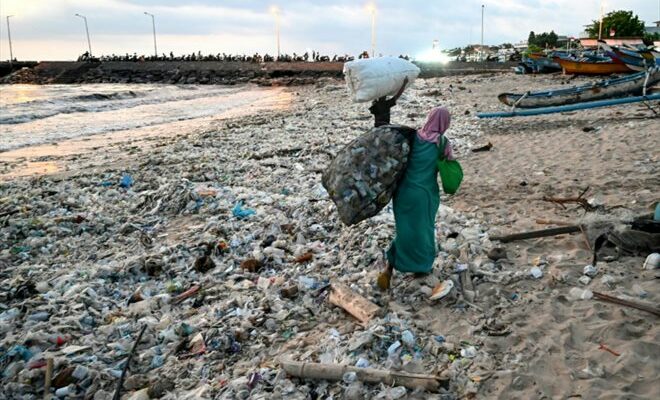A man digs through garbage and plastic waste washed up on Kedonganan beach, on the Indonesian island of Bali, March 19, 2024 (AFP/SONNY TUMBELAKA)
Bali, its white sand beaches… and garbage? Beloved by tourists, the Indonesian island paradise faces a flood of plastic waste, an annual problem caused by the monsoon and which shocks tourists.
Indonesia indeed has a colossal sea pollution problem and is one of the countries that releases the most plastic waste and other marine debris.
Last week, Kedonganan beach in the tourist area of Kuta was covered in bottles, glasses and packaging, many of them blown from Indonesian cities by monsoon winds and rains.
“I ask all Indonesians not to throw their garbage on wastelands, cliffs and rivers, because it will end up in the sea and reach our beautiful beaches,” Anak Agung Dalem, an official with the local environment agency.
Nearly 300 agents and six excavators were mobilized to clean the beach with the help of a local NGO, he said.
A sinister vision that has sickened some tourists, on whom a large part of Bali’s economy depends.

People rummage through garbage and plastic waste washed up on Kedonganan beach, on the Indonesian island of Bali, March 19, 2024 (AFP/SONNY TUMBELAKA)
“I came here because I heard it was a very nice place to visit, but what I see is all this plastic. It’s a real disaster for me,” laments French tourist Denis Le Merre, from Australia.
“I don’t think I’ll ever come back,” he sighs.
Not far from the excavators, a few locals were collecting trash that they hoped to resell for a few dollars.
– Annual phenomenon –
Every year, torrential rains carry mountains of plastic waste from Indonesian cities and rivers into the ocean, some of which can end up several hundred kilometers on the beaches of Bali.

A man collects recyclable waste to resell it among the garbage washed up on Kedonganan beach, March 19, 2024 on the Indonesian island of Bali (AFP/SONNY TUMBELAKA)
Such tidal waves are a “repeating” phenomenon at Kedonganan Beach and others every year due to rainfall and monsoon winds between the months of November and March, according to Anak Agung Dalem.
Indonesia, an archipelago of more than 17,000 islands, has committed to reducing plastic waste at sea by 70% by 2025.
But despite the promises, faced with the spectacle of a polluted seaside, tourists let their frustration explode.
“I think it’s horrible. And for tourists, I think that’s why many don’t visit Bali. Because of the garbage,” said Danil Kovalev, a Russian who has visited the island three times.
“Sometimes I see the same thing on other beaches.”

A woman carries bags of recyclable waste recovered from garbage washed up on Kedonganan beach, on the Indonesian island of Bali, March 19, 2024 (AFP/SONNY TUMBELAKA)
Although concerned about the waste problem, locals are certain that the beauty of Bali, which attracts millions of visitors each year, will eventually prevail.
“If the garbage is cleaned, this place will be more beautiful and more people will come,” said Paulina Kaka, a resident of Kedonganan.
“The waste that arrived in the sea came from all regions (…) So we will clean it up but it will take time,” warns Anak Agung Dalem, calling on tourists to be patient. “The beach cannot be separated from the ocean.”
© 2024 AFP
Did you like this article ? Share it with your friends using the buttons below.




